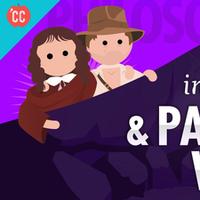15b. Indiana Jones & Pascal's Wager. Part 2/2.
{Video: 04:46}
Now, some critics have pointed out that, when it comes to a really usable belief system, you're gonna need morethan just: fake it ‘til you make it. For example, maybe you were one of those kids, raised in a religious household, who was just never feeling it. We all know people who were immersed in a culture of religious belief from birth, but end up to rejecting those beliefs as adults. And for those people, trying to force yourself to believe is not only ineffective, it can lead to some pretty serious unhappiness – the exact opposite of what a pragmatist wants.
So it might be that, for a pragmatist, the best advice for non-believers is that they just gotta live their lives. Maybe they'll find God and maybe they won't, but making yourself swallow it like medicine doesn't seem like the way to maximize belief. OK, so Pascal said that we should believe in God because belief is just practically useful. But Soren Kierkegaard, the 19th century Danish philosopher, went even further. He adopted the famous tenant of fideism, stating: “I believe because it is absurd to believe.” Fideism is the school of thought that says religious belief has to come from faith alone. It says that stuff like arguments and evidence actually kill what's great about religion – which is wonder and mystery. Kierkegaard said that the fantastic thing about belief in God is that it's entirely irrational – you can't do it with your brain. You have to take what he called the leap to faith. And, again, here I turn to Indiana Jones. Remember when Indy faces his last test of faith-slash-booby trap in the Last Crusade? He has to try to make an impossible jump across a scary dark pit to get to the Holy Grail.
There is no way he can do it – it's suicide. But, it turns out, there's a bridge. He can't see it, but in order to find out that it's there, he has to take that step. He has to take a chance on something that defies all reason. That's what religion is all about, according to Kierkegaard. We jump and hope like hell that God catches us. And the only way to know, is to jump. We have to surrender reason to get to truth.
Now, I hate to break it to you, but this is the end of our unit on the philosophy of religion. I'm interested to hear what you think about that in the comments. But before we go, I want to head to the Thought Bubble for some Flash Philosophy. Our old friend Bertrand Russell once posited the existence of a china teapot, orbiting the sun somewhere between Earth and Mars. Let's say that back on Earth there were a bunch of Teapot-ists, people who argued that, since we can't disprove the teapot's existence, they were justified in believing in it. Not only that, they constructed great buildings, erected statues, composed songs, held weekly services, and appealed to the teapot for help in their daily lives.
But everyone else thought the Teapot-ists were ridiculous, because there was no evidence to support their belief in the teapot. For their part, the Teapot-ists just replied that none of the Ateapot-ists could prove that it wasn't there. Thanks, Thought Bubble!
Aaand I'm sure you can see where I'm going with this. Pragmatism, or the leap to faith, might be a solution to the problem of God's existence, if you're not satisfied with any of the other, more evidence-based arguments. But believing something because it's expedient – or because it frees you from having to have any reasons at all – can still have its risks. After all, if we can leap to God, we can also leap to Russell's teapot, or to the Flying Spaghetti Monster. Or, much worse, we could leap to particular beliefs about God – like that he wants us to deny rights to certain kinds of people – or kill them. These beliefs aren't representative of the views of most theists, but the problem is, if you're giving up on reasons and evidence, all beliefs are philosophically equal. We count on evidence and justification to help us adjudicate between beliefs, to decide what we value. If you throw that out, and fall back on faith alone, the sum of your religious arguments is going to end up being: I have faith in the things I choose to have faith in. And in that case, no one can tell anyone else that their belief is wrong, or dangerous, or unjustified, because you can't justify faith. Today we've thought a bunch about about religious pragmatism and Pascal's Wager, and we've also learned about fideism and Kierkegaard's leap to faith. Next time we're going to learn about existentialism, which is a movement Kierkegaard is considered to belong to. But as we will see, existentialists can come in many different flavors.
This episode of Crash Course Philosophy is made possible by Squarespace. Squarespace is a way to create a website, blog or online store for you and your ideas. Squarespace features a user-friendly interface, custom templates and 24/7 customer support. Try Squarespace at squarespace.com/crashcourse for a special offer. Squarespace: share your passion with the world.
Crash Course Philosophy is produced in association with PBS Digital Studios. You can head over to their channel to check out amazing shows like The Art Assignment, Shanx FX, and It's Okay To Be Smart This episode of Crash Course was filmed in the Doctor Cheryl C. Kinney Crash Course Studio.

